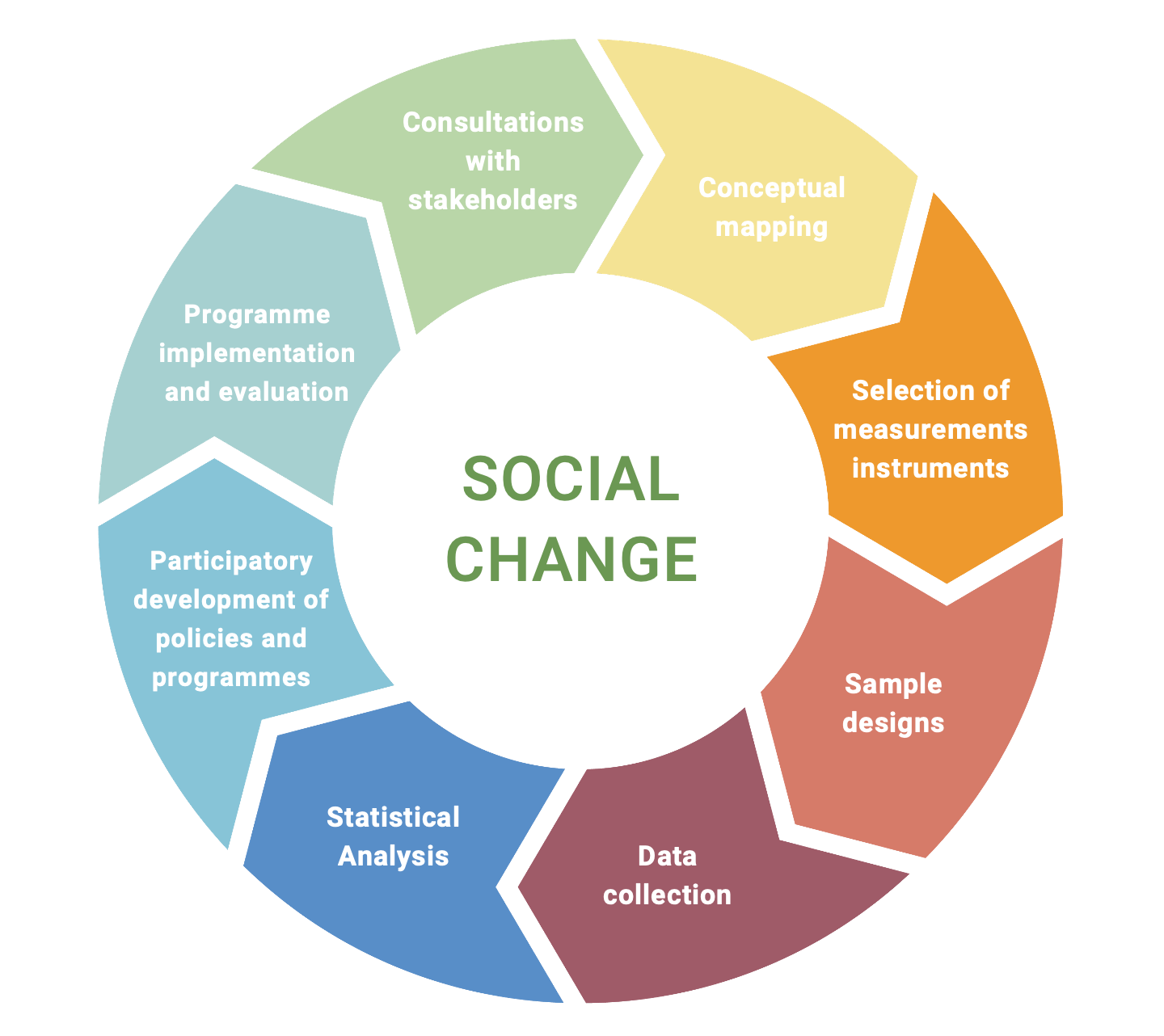SCORE methodology is a robust scientific assessment tool that is carefully calibrated to each context to investigate societal dynamics and guide evidence-based policy and programme design for enhancing social cohesion, sustaining peace and building resilience. SCORE combines an extensive participatory research process with advanced data analysis to identify the drivers of conflict dynamics and peaceful social change. For a more detailed explanation of SCORE methodology, please visit the methodological publications here.
The methodology is underpinned by a process framework, which ensures local ownership of project results and helps align research objectives with the specific policy outcomes of different partners. Figure 1 below illustrates the SCORE process, which is instrumental in ensuring national ownership of results.
Figure 1. SCORE Process Cycle

The SCORE for South Sudan was calibrated in September 2019, involving a field assessment mission to Juba. During the mission the SeeD team consulted with key informant stakeholders, developed a conceptual map for the SCORE, selected the appropriate data collection tools and designed the sample frame. The goal of calibration is to establish a coherent research framework which incorporates different stakeholder perspectives, socio-economic challenges and competing hypotheses about root causes of socio-political tensions and obstacles to inclusive economic growth and human development.
The SCORE questionnaire serves as the principal data collection tool, while the sample frame is designed to ensure results can be reported for different sub-regions within the country, and for specific demographic and social groups. Data collection is conducted in collaboration with established researchers or research agencies, who must display cultural awareness and sensitivity to ensure a reliable data collection process.
The total sample size in South Sudan was 2,139 covering 5 regions, namely Aweil, Bor, Yambio, Rumbek and Bentiu. Within each of the 5 selected regions, 8 urban and 7 rural bomas were sampled. To create a multi-level analysis 3 parallel surveys were administered and the total sample was sub-divided into three components. The 3 surveys broadly tested different dimensions of social and political life, with selected questions featuring in all 3 instruments.
- 1,380 surveys were administered to 20 randomly selected individuals in each boma and focused on subjective choices, attitudes and experiences, such as support for the peace agreement or individual approaches to conflict resolution.
- 690 surveys were administered to purposely selected 10 respondents (e.g. well-informed respondents/community representatives) from each boma, who could represent community attitudes. This component explored issues relating to community level assets and processes which shaped individual experiences such as questions assessing public services, community leadership and civic activism.
- 69 surveys were administered to chiefs (or equivalent) of the selected bomas, who provided their personal perspectives on a range of social, economic and political issues.
The individual responses were then aggregated to calculate a score for each boma, using advanced data analysis techniques, to capture the quality of citizen-state relations, intergroup dynamics, psychosocial functioning and civic behavioural traits. This allowed us to use a multi-level approach to assess both individual and communal factors influencing individuals’ responses to questions in the survey. It also provided a deeper understanding of why an individual would select a particular answer or proposition, reflecting both an individual value and community (boma level) contextual reality. For a detailed narrative of the analysis and its policy implications, please read the full report here.
The overall data collection for all three components was implemented in two separate phases. The first was conducted in the regions of Aweil, Bor and Yambio between 1 November and 10 December 2019. The second phase was administered in the regions of Bentiu and Rumbek between 23 March and 15 June 2020, with a two-month disruption between April – June due to Covid-19 restrictions.
The timing of the two phases of data collection is expected to have an effect on responses, as both the psychosocial state of individuals and their livelihoods strategies tend to vary with seasons. This may be more acute in areas which go through more extreme cycles of drought or plenty. Areas which were surveyed closer to April may therefore have worse scores than areas which were surveyed earlier, because April in South Sudan tends to be the time of year where food stores begin to run low, until the next harvest in September. Furthermore, the dry season (October to March) may also be associated with higher levels of cattle raiding or violence driven by water or food scarcity.
Note: Due to resource constraints the project did not survey deep rural areas of the respective regions or the states the selected regions are located in, and this is acknowledged as one of the limitations of the study, since opinions of citizens in deep rural areas were not captured during this pilot initiative. On the other hand, since the urban and rural areas around the five towns surveyed contain citizens who most frequently come into contact with institutions and who most intensely participate in the country’s economic and sociopolitical life, such a town-centred sample better reflects the community dynamics and the social cohesion challenges which South Sudan will face in the coming years.
